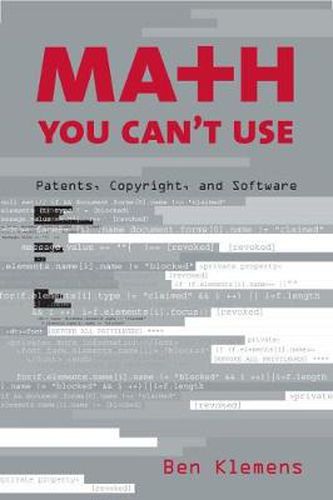Readings Newsletter
Become a Readings Member to make your shopping experience even easier.
Sign in or sign up for free!
You’re not far away from qualifying for FREE standard shipping within Australia
You’ve qualified for FREE standard shipping within Australia
The cart is loading…






This lively and innovative book is about computer code and the legal controls and restrictions on those who write it. The widespread use of personal computers and the Internet have made it possible to release new data or tools instantaneously to virtually the entire world. However, while the digital revolution allows quick and extensive use of these intellectual properties, it also means that their developers face new challenges in retaining their rights as creators. Drawing on a host of examples, Ben Klemens describes and analyzes the intellectual property issues involved in the development of computer software. He focuses on software patents because of their powerful effect on the software market, but he also provides an extensive discussion of how traditional copyright laws can be applied to code. The book concludes with a discussion of recommendations to ease the constraints on software development.
This is the first book to confront these problems with serious policy solutions. It is sure to become the standard reference for software developers, those concerned with intellectual property issues, and for policymakers seeking direction. It is critical that public policy on these issues facilitates progress rather than hindering it. There is too much at stake.
$9.00 standard shipping within Australia
FREE standard shipping within Australia for orders over $100.00
Express & International shipping calculated at checkout
This lively and innovative book is about computer code and the legal controls and restrictions on those who write it. The widespread use of personal computers and the Internet have made it possible to release new data or tools instantaneously to virtually the entire world. However, while the digital revolution allows quick and extensive use of these intellectual properties, it also means that their developers face new challenges in retaining their rights as creators. Drawing on a host of examples, Ben Klemens describes and analyzes the intellectual property issues involved in the development of computer software. He focuses on software patents because of their powerful effect on the software market, but he also provides an extensive discussion of how traditional copyright laws can be applied to code. The book concludes with a discussion of recommendations to ease the constraints on software development.
This is the first book to confront these problems with serious policy solutions. It is sure to become the standard reference for software developers, those concerned with intellectual property issues, and for policymakers seeking direction. It is critical that public policy on these issues facilitates progress rather than hindering it. There is too much at stake.